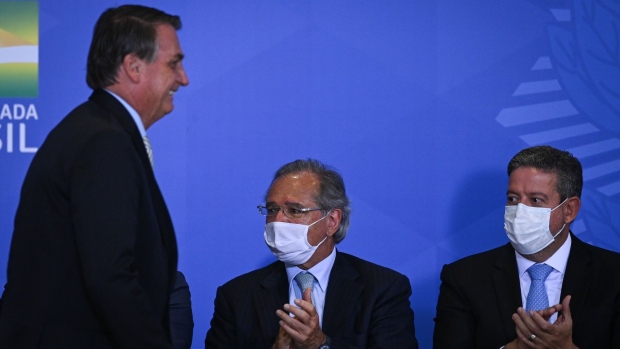Aug 19, 2021
Brazil’s Income Tax Bill Stalls, Putting Reform Agenda at Risk
, Bloomberg News

(Bloomberg) -- Brazil’s long-awaited income tax overhaul is facing increasing opposition by key lawmakers, mayors and business leaders, diminishing chances of its approval anytime soon and hurting investor confidence in the country.
The bill, originally designed by Economy Minister Paulo Guedes to lower taxes on corporations while introducing a levy on dividends, is unlikely to pass by the lower house in its current form, according to seven lawmakers from the government coalition and the opposition, four of which requested anonymity to speak about the negotiations.
“There’s a huge impasse, nearly all productive sectors are against the text of the bill,” Marcelo Ramos, deputy head of the lower house, said in an interview. “We’re aware that we can’t put it to a vote with such a degree of resistance.”
Issues hampering the reform include a possible loss of revenue by states and municipalities, the end of fiscal subsidies for sectors that were hurt by the pandemic, and the imposition of a tax on dividends -- which is opposed by allied lawmakers and supported by the opposition, as long as it’s a progressive levy varying according to companies’ revenues, the lawmakers said.
Read More: Brazil Rushes to Approve Tax Reform Before Presidential Election
The overhaul of Brazil’s income tax system was considered one of the least controversial chapters of a broader reform envisioned by Guedes, which eventually included merging federal levies into a value-added tax, among other goals. Lower house Speaker Arthur Lira has tried and failed to put the current proposal to a vote for three times in the past two weeks. He has yet to schedule a new attempt.
Markets Tank
Lack of progress of reforms, coupled with concerns about Brazil’s fiscal outlook and simmering political tensions, have hit local assets. Hedge fund managers from Verde Asset Management to SPX Capital have warned “the government’s erratic approach” to fiscal policy is making markets wary.
The benchmark Ibovespa equity index dropped to the lowest level since April, also reflecting concerns about the global economic recovery and prospects of diminishing U.S. stimulus. The Brazilian real is the worst performer among emerging-market currencies over the past five days, while swap rates have surged, with the contract maturing in January 2027 rising for seven straight sessions.
This week, political consultancy Eurasia downgraded Brazil’s long-term trajectory to negative from neutral, expecting the quality of the economic agenda in congress to deteriorate going forward.
Seeking the Opposition
Guedes, facing opposition to the taxation of dividends within the government coalition itself, has reached out to Alessandro Molon, the leader of a group of 130 opposition lawmakers in the lower house, in a bid to broker a deal.
They’ve scheduled a meeting for Aug. 24, when Molon will present a list of requirements to make the bill “fairer.”
“We are willing to talk with the economy minister to try a better framework for this reform,” he said in an interview. “If it’s an unfair bill, we won’t support it. We understand that the current proposal is unfair.”
The economy ministry didn’t immediately respond to a request for comment.
The government leader in the lower house, Ricardo Barros, told reporters on Wednesday that the bill may go to a vote again in two weeks, when he expects to have a more consensual proposal.
For now, not even parties that support the government are optimistic about the approval of the current text.
“There is an impasse, there is no atmosphere for that,” said house representative Elmar Nascimento, former leader of the Democrats, a party that has traditionally supported the government’s economic agenda.
©2021 Bloomberg L.P.








